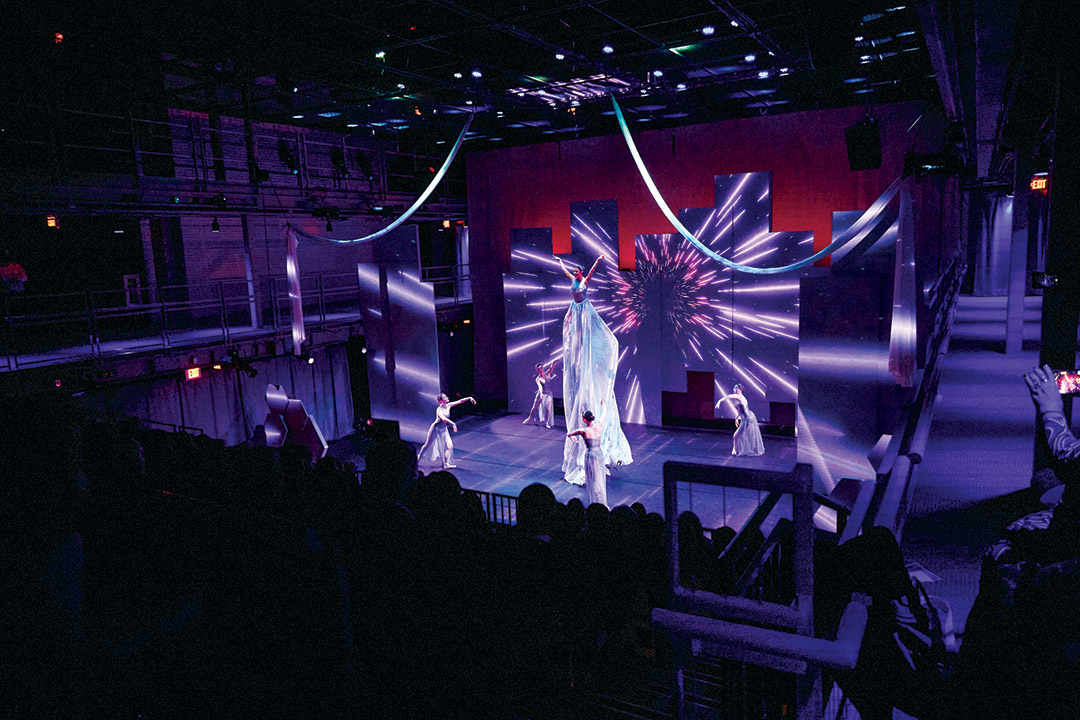Performing Arts Scholars pursue their passions
Alycia Wachtel
AstroDance II: Across the Universe, which featured a variety of dance, aerial arts, and augmented reality, was the inaugural production in December 2023 in the Sklarsky Glass Box Theater in the SHED.
A revolutionary idea was established for RIT to have the leading college performing arts program in the country for non-performing arts majors.
RIT President David Munson said he’s noticed the brightest, most creative, and most innovative students with technical majors also tend to be involved in performing arts.
Beyond performing arts
RIT’s Art Experience (ArtEx) program creates opportunities for students with majors outside of the College of Art and Design to explore a variety of artistic media, ranging from ceramics and wood to molten metal and glass. The enrichment program has welcomed more than 400 students since officially launching in fall 2023.
In 2019, RIT initiated the Performing Arts Scholars program, offering partial scholarships to incoming students who wanted to be involved in the arts during their time on campus.
The students can take private music, dance, or vocal lessons; participate in a musical, ensemble or dance troupe; or even work behind the scenes with wardrobes, sound, lighting, or set construction.
The number of new scholars has increased each year, with more than 2,000 currently on campus, including a record 550 new students this academic year. Many of them have said the emphasis on performing arts was a decisive factor for attending RIT.
RIT historically has a strong history in the performing arts with its National Technical Institute for the Deaf, which continues to offer theatrical and dance productions each year.
Since the creation of the Performing Arts Scholars program, more practice space has been allocated to allow for the influx of performing artists, additional faculty members have been hired in the School of Performing Arts, and ground was broken in 2023 on a new 750-seat musical performance theater scheduled to open on campus in 2026.
Data shows the persistence rates of students receiving the scholarships are 4 to 8 percent higher than other students in their first year at RIT.
Quincy Myles Jr., from Buffalo, N.Y., was in the first class of Performing Arts Scholars and received the scholarship for five years. He is currently an MBA student at RIT after earning his bachelor’s degree in software engineering.
“When they first offered the scholarship, I knew this would be a school where I can still continue my passion in the arts,” he said. “During my first year, I wanted to try out as much as possible and see what I was really interested in.”
He took voice lessons and joined RIT Singers, RIT Players, and a jazz ensemble. He remains a member of the a cappella group Eight Beat Measure as a graduate student.
Myles expects to continue his musical hobby after RIT. “Being part of performing arts has been my way of unwinding and meeting new people,” he said.
Brandon Faunce, a third-year software engineering major from Fairfield, Conn., also said his scholarship was a factor in attending RIT.
“I knew that I wanted a place that could support both my technical and musical interests,” said Faunce, who plays cello and performed twice in the Ovation: RIT Performing Arts Showcase, which was started by Munson in 2018. Faunce won both times.
“RIT’s creative community has since allowed me to have such a diverse and unique set of experiences in performing arts and expand my horizons as a musician,” he said.










